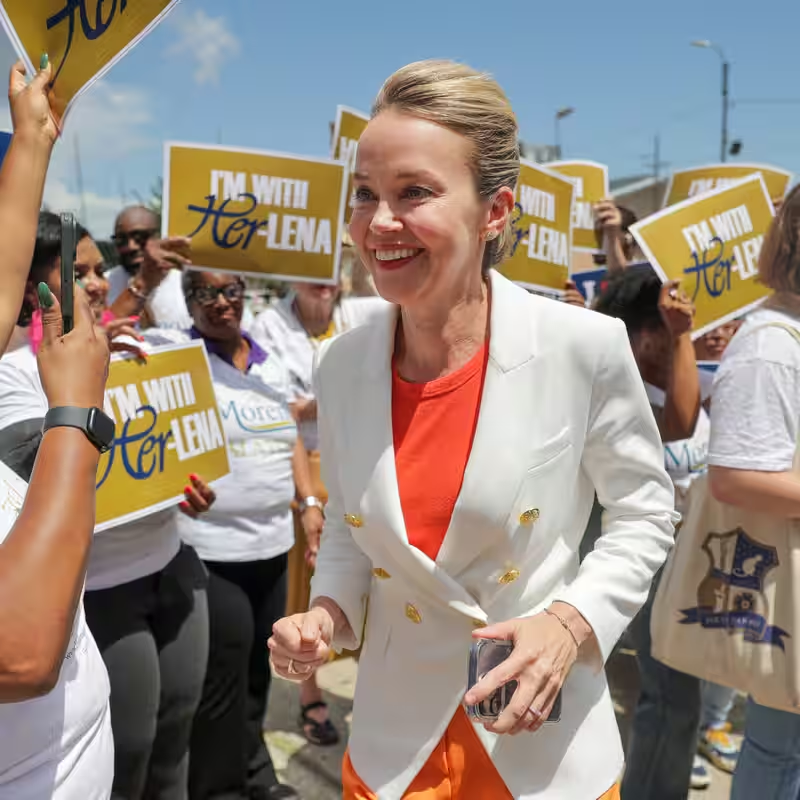In a landmark election that signals a turning point for a city weary of dysfunction, Helena Moreno has been elected mayor of New Orleans—becoming the first Hispanic person and only the second woman to lead Louisiana’s largest city. Her decisive victory, with 55% of the vote in Saturday’s jungle primary, reflects a groundswell of public demand for change amid crumbling infrastructure, soaring insurance costs, and lingering trauma from recent crises.
Helena Moreno’s Historic Win
The mayor race was never just about politics—it was a referendum on New Orleans’ future. Facing a field of a dozen candidates, Moreno, a Democratic city councilwoman and former investigative journalist, outpaced her nearest rival, State Senator Royce Duplessis, by a staggering 33 points. Under Louisiana’s unique jungle primary system, her outright majority meant no runoff was needed.
“I really hope that you are not weary,” Moreno told a jubilant crowd in her victory speech, “because the hard work is actually just ahead.”
A City at a Crossroads
New Orleans has endured a relentless string of setbacks in recent years:
- 2020: Mardi Gras became a coronavirus superspreader event, crippling the tourism-dependent economy.
- 2021: Hurricane Ida knocked out power for weeks and worsened Louisiana’s property insurance crisis.
- 2025: A New Year’s Day terrorist attack on Bourbon Street killed 14 people and strained city finances.
Compounding these shocks are chronic issues: pothole-riddled streets, unaffordable housing, and a steep population decline. Residents have grown frustrated with what they see as misplaced priorities—like lavish Super Bowl preparations while basic services lag.
From Journalist to Leader
Moreno’s path to City Hall is as unconventional as it is inspiring. Born in Xalapa, Mexico, she moved to Texas as a child and later became a TV reporter in New Orleans. Her Emmy-winning coverage of Hurricane Katrina’s aftermath cemented her local credibility.
She entered politics in 2010 as a state representative and joined the City Council in 2017. Known for her sharp critiques of bureaucratic inertia, she often cited the Super Bowl’s rapid citywide coordination as a model for fixing everyday problems—like the city’s infamous potholes.
Key Endorsements That Fueled Her Campaign
| Supporter | Role | Significance |
|---|---|---|
| Mitch Landrieu | Former New Orleans Mayor | Symbolic passing of the torch from a major political dynasty |
| Mary Landrieu | Former U.S. Senator | Reinforced Democratic establishment backing |
| Prominent Black Pastors | Community Leaders | Critical in a majority-Black city; showed cross-racial coalition |
| Kamala Harris | U.S. Vice President | National recognition; called Moreno a “star” in urban leadership |
Breaking Barriers
Moreno’s election shatters long-standing norms. New Orleans mayors have historically been native-born men, often from political families. The outgoing mayor, LaToya Cantrell—herself an “outsider” compared to predecessors—was recently indicted in a federal investigation involving a romantic relationship with a police officer.
Moreno, 48, whose first language is Spanish, represents a new chapter: one that embraces the city’s evolving demographics and demands pragmatic, inclusive leadership.
What’s Next?
Moreno takes office in January with a daunting to-do list: stabilize city finances, rebuild trust in public services, and ensure recovery efforts benefit all residents—not just tourists. Her mantra? “A city that works for everyone.”
As one supporter put it on election night: “She’s not just making history—she’s fixing it.”




